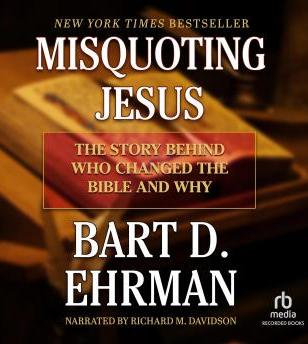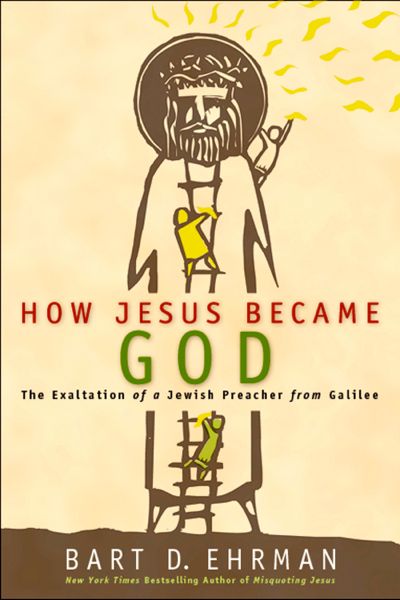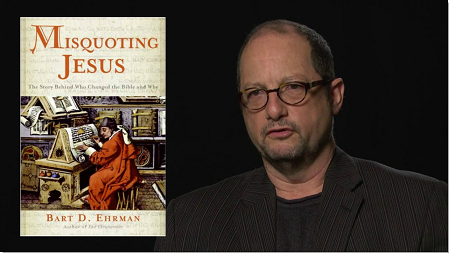|
home | what's new | other sites | contact | about |
|||||
|
Word Gems exploring self-realization, sacred personhood, and full humanity
Prof. Bart D. Ehrman
return to the main-page article on "Bible"
Dr. Ehrman speaks of this in his book, "Misquoting Jesus."
“In my [student] paper [concerning David and Abiathar – see the above article in this series] for [Princeton] Professor Story, I developed a long and complicated argument to the effect that even though Mark indicates this happened ‘when Abiathar was the high priest,’ it doesn’t really mean that Abiathar was the high priest… “My argument was based on the meaning of the Greek words involved and was a bit convoluted… But at the end of my paper [the professor] made a simple one-line comment that for some reason went straight through me. He wrote: ‘Maybe Mark just made a mistake.’ “I started thinking about it … realizing that I had to do some pretty fancy exegetical footwork to get around the problem, and that my solution was in fact a bit of a stretch. I finally concluded, “Hmm… maybe Mark did make a mistake.” “… what is one to make of all these differences? If one wants to insist that God inspired the very words of scripture, what would be the point if we don’t have the very words of scripture? In some places … we simply cannot be sure that we have reconstructed the original text accurately. It’s a bit hard to know what the words of the Bible mean if we don’t even know what the words are! “This became a problem for my view of inspiration, for I came to realize that it would have been no more difficult for God to preserve the words of scripture than it would have been for him to inspire them in the first place. If he wanted his people to have his words, surely he would have given them to them (and possibly even given them the words in a language they could understand, rather than Greek and Hebrew). The fact that we don’t have the words surely must show, I reasoned, that he did not preserve them for us. And if he didn’t perform that miracle, there seemed to be no reason to think that he performed the earlier miracle of inspiring those words… “This was a human book, from beginning to end… “What if we have to figure out how to live and what to believe on our own, without setting up the Bible as a false idol?”
Editor’s note: Yes, what if we have to actually use the minds God gave to us in order to “figure out how to live and what to believe”? Now, that’s a novel idea, one that’s escaped the attention of those so eager to surrender their brains to some denominated Dear Leader – be it the human or the printed form. As I commented in the opening remarks of the "Bible" page, the ubiquitous and incessant defense of the Bible by convoluted argument quickly becomes self-defeating. If such practice is needed to shore up the defenses of an "infallible" Bible, then what good is the Bible? - if no one knows what the words mean, barring some contorted and "fancy exegetical footwork" - which helps no one. The earliest New Testament document Galatians sends us in the right direction. This was written by Paul as he was just beginning to understand the implications of what it means to “live in the Spirit.” He was rapidly discarding his Pharisee thought-forms - as we don’t come to understand everything at once; even after a mystical experience, which might take 50 years, and into the new world, to unpack. Nevertheless, even at the time of Galatians, Paul understood that the legalistic, ritualistic mindset – concerning any religion, for Jew or Gentile – is to be viewed as a “kindergarten” stage of human development, just the “ABCs” of reality, and even a kind of “prison” for the mind. These are Paul's analogies, not mine. And these are clear statements in Galatians - but we’re certain that fundamentalists will scurry to inform us that these clear words surely do not mean what they might ordinarily signify. Final note: Professor Ehrman always offers us cogent reasoning, and facts from the manuscripts. He didn’t alter the texts, this was done a long time ago, but many small and fearful minds attack him for being anti-Bible by presenting facts. There are entire books devoted, not so much to quiet, thoughtful rebuttal of Ehrman’s presentations – which is very difficult as Ehrman has the backing of the best scholars in the world – but, instead of rational discourse we get, from these fundamentalists, a personal attack on the Professor. Note this: an ad hominem assault is the mark of a false teacher. As they have no truth on their side, they indulge in the "attorney's last resort" ploy. We see this untoward dynamic, this fake-news, in the article (above) on “the Pastorals”: the real Paul always engaged purported heresy with detailed, lawyerly, precise counter-argument. But the forgers, the plastic-banana teachers, and their philosophical brethren today, go for character assassination along with pious platitudes of cultish origin. It’s all they have, nothing of merit to say, only invective.
|
|||||
|
|


